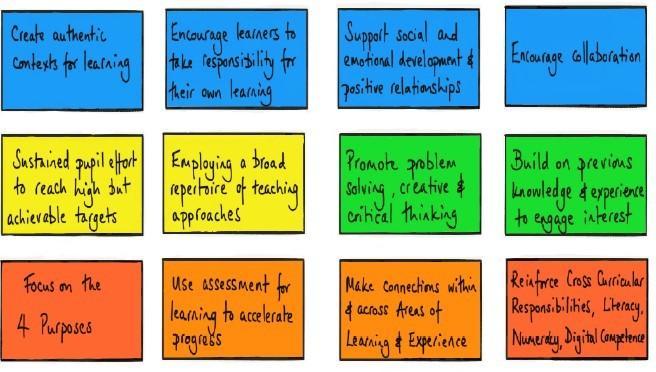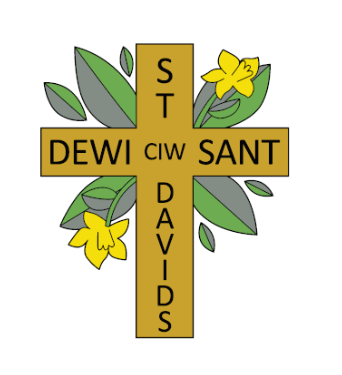Curriculum For Wales
Curriculum for Wales at St David's CiW Primary School
Curriculum for Wales enthuses learners from 3 to 16, giving them the foundations they need to succeed in a changing world.
Click here to find out about our different Areas of Learning & Experience
The Four Purposes
Everything that is taught and learnt at school will have these 4 core purposes as starting points when staff plan for the enriched learning experiences that pupils will receive. Our pupils are at the heart of reshaping our curriculum. Their voice guides us in our decision making and influences learning. The four purposes will be at the heart of our new curriculum. They will be the starting point for all decisions on the content and experiences developed as part of the curriculum to support our children and young people to be: Ambitious Capable Learners; Ethical, informed citizens; Enterprising, Creative Contributors; Healthy, Confident Individuals.
Key Elements of the Curriculum
The new curriculum will include:
- 6 Areas of Learning and Experience from 3 to 16
- 3 cross curriculum responsibilities: literacy, numeracy and digital competence
- progression reference points at ages 5, 8, 11, 14 and 16
- achievement outcomes which describe expected achievements at each progression reference point.
12 Pedagogical Principles

Cross Curricular Responsibilities
There is a range of competences and skills which are foundations for almost all learning and are essential to being able to participate successfully and confidently in the modern world. Priority has already been given to literacy and numeracy within the Welsh curriculum through the LNF, including Routes to literacy and Routes to numeracy (RFL). Digital competence is increasingly fundamental to learning and life and that it should have similar status within the curriculum to that of literacy and numeracy. Literacy, numeracy and digital competence should be Cross-curriculum Responsibilities for all teachers and people who work with children and young people. The curriculum structure needs to ensure that children and young people develop high levels of competence in these aspects and have frequent opportunities to develop, extend and apply them across the curriculum.
Literacy
Competence in literacy, including competence in the spoken word, syntax and spelling, is essential for learning across the curriculum, not least because of the fundamental role of language in thinking. The key to developing command of these skills lies not in repetition and drill for significant periods of time during the school day but in a sound understanding of their essential components supported by developmentally appropriate teaching and learning and rich contexts within which they can be reinforced, extended and applied. Without this, as one contributor remarked, ‘There is a real danger that we are teaching the mechanics of writing but giving the children nothing to write about’. Children and young people also need every opportunity to explain thinking, explore and discuss ideas and use language skills at an appropriate level. The literacy component of the LNF provides guidance about a common approach to the reinforcement of such skills at different developmental stages.
Numeracy
Competence in numeracy, including arithmetical and data-handling skills, is deployed widely across the curriculum, and competence in numeracy is essential for independent living and work. Children and young people need regular opportunities to deepen their understanding of number and, as with literacy, to reinforce and use their numeracy skills in different contexts. It is important that all teachers and other staff who work with children and young people have an understanding of how best to reinforce these skills and take opportunities to consolidate learning appropriately. The numeracy component of the LNF provides guidance about a common approach to the reinforcement of such skills at different developmental stages.
DCF
Digital competence plays an increasingly powerful role in the lives of children and young people, for communication, networking, information, leisure and entertainment as well as for an increasing range of transactions and educational applications. The ability to use digital technology skills creatively is an increasingly common feature of the modern workplace, for example for developing simulated models that test out ideas safely and inexpensively or when using complex medical equipment that needs to be reprogrammed to match the patient’s individual needs.
